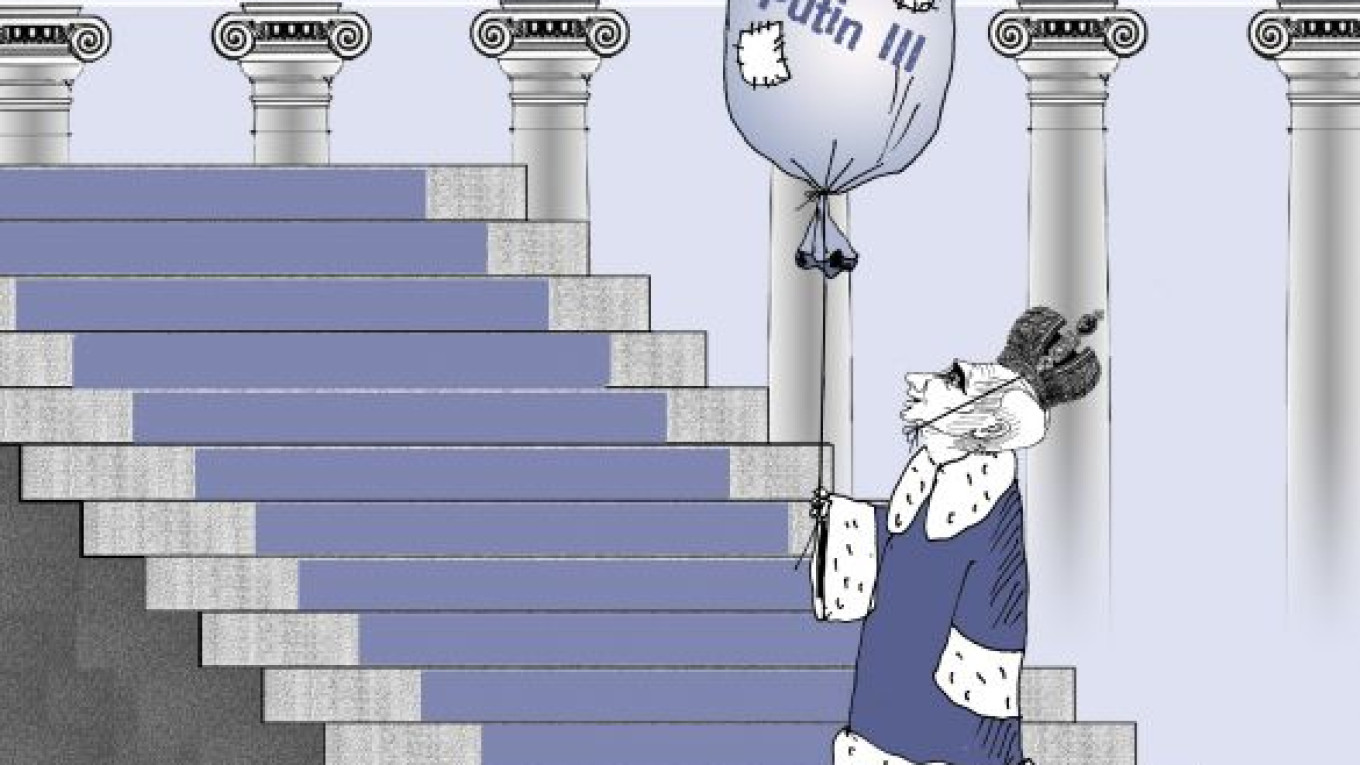Few people — least of all Prime Minister Vladimir Putin — could have imagined in December that Russians would, for the first time in 20 years, wake up and, with tens of thousands, rally against the government. Unlike the Arab Spring rebellions, the driving force behind the ongoing protests is not Russia's poor and disadvantaged, but rather the country's rising urban middle class. That is an important difference because successful democratic transitions have historically almost always required a politically mobilized middle class.
Well-educated and successful, middle-class Russians have taken to the streets to gain respect from a Kremlin hierarchy that is mired in deceit and corruption. The last straw was the blatant falsification of December's parliamentary elections, which reinforced citizens' sense that the regime regards them with contempt. Russians are particularly outraged by Putin's arrogant treatment of the presidency as an office that can be "loaned" to loyal allies — like President Dmitry Medvedev — and reclaimed whenever he wishes.
But despite the large protests in Moscow, St. Petersburg and other cities, the authorities rejected demonstrators' demands to nullify the election results. Indeed, it is becoming increasingly clear that, by hook or by crook, Putin will spend six more years as Russia's ruler.
What will another Putin presidency mean for Russia?
Securely fenced off from real political competition, Putin cannot return to the Kremlin as "the president of hope," as he styled himself at the beginning of his first term in 2000. Moreover, he no longer resembles Putin the "national leader," who, in his second term, reinvigorated the state and presided over an economic boom.
So who can Putin III be? How will he use the enormous powers bestowed to the Russian president in a political system that lacks any real checks and balances?
Putin's pre-election monologues and articles suggest an ominous answer. His presidency will be based on a genuine misunderstanding of the structure of contemporary international relations, markets and democracy, and it will be driven by his uncontrollable messianism. Calls for liberalism coexistence with statist dogma and cheap populism trump regard for complexity and hard choices.
In fact, Putin has nothing to offer Russians aside from his own vulgar, hackneyed rhetoric. He no longer understands the problems facing the country and therefore has no idea what needs to be done. Nor does he have any anxiety about the damage that his misrule and abuse of power portends for Russia's future. Putin's third presidency will be a reign of instinct and appetite, rather than a government of reason and restraint.
Of course, Putin will begin his new term with earnest-sounding words about renewal, development, democratization and the scourge of corruption. He might even offer some symbolic gestures, such as dissociating himself from objectionable political and media figures or showing leniency toward those he has imprisoned for opposing him. But all of this would be aimed at maintaining political power, rather than reforming it.
Indeed, the Kremlin has produced much lofty talk of freedom and modernization in recent years. But without the political will to implement the necessary changes, such promises are destined to remain just that — promises. The problem is that the principle of free and fair competition that characterizes the developed world is subversive of the Russian state that Putin has built — a state based on the merger of government and business.
As a result, even if the will to change suddenly and miraculously emerged in the Kremlin, the illegitimacy of the entire federal government would render effective policymaking impossible. Instead of formulating and implementing comprehensive and transparent reforms, the government would have no choice but to continue to indulge vested interests.
No one should be deceived by any concessions that the Kremlin makes. Russia's liberals would gain nothing from compromising their consciences and blessing Putin's third term. As before, they would get no real power in return, and any possibility of genuine change from within the existing power structure would remain minimal. Indeed, steps by the authorities to mollify public opinion will continue to be accompanied by increased pressure on the opposition and on civil-society organizations.
In the months following Putin's return to the presidency, much will depend upon the country's civil society and the protest movement's leaders. Russians must persevere and formulate a set of specific political demands. They must insist upon real and dramatic changes — not superficial, cosmetic improvements — to the political system. The main objective now is to strive for free and fair elections that will ultimately lead to a legitimate and responsible government.
The list of pressing issues facing Russia is already long, and their resolution can no longer be delayed. As long as Putin remains in control, that list will only grow.
Mikhail Kasyanov, prime minister of Russia from 2000 to 2004, is a co-founder of the opposition Party of People's Freedom. © Project Syndicate
A Message from The Moscow Times:
Dear readers,
We are facing unprecedented challenges. Russia's Prosecutor General's Office has designated The Moscow Times as an "undesirable" organization, criminalizing our work and putting our staff at risk of prosecution. This follows our earlier unjust labeling as a "foreign agent."
These actions are direct attempts to silence independent journalism in Russia. The authorities claim our work "discredits the decisions of the Russian leadership." We see things differently: we strive to provide accurate, unbiased reporting on Russia.
We, the journalists of The Moscow Times, refuse to be silenced. But to continue our work, we need your help.
Your support, no matter how small, makes a world of difference. If you can, please support us monthly starting from just $2. It's quick to set up, and every contribution makes a significant impact.
By supporting The Moscow Times, you're defending open, independent journalism in the face of repression. Thank you for standing with us.
Remind me later.


